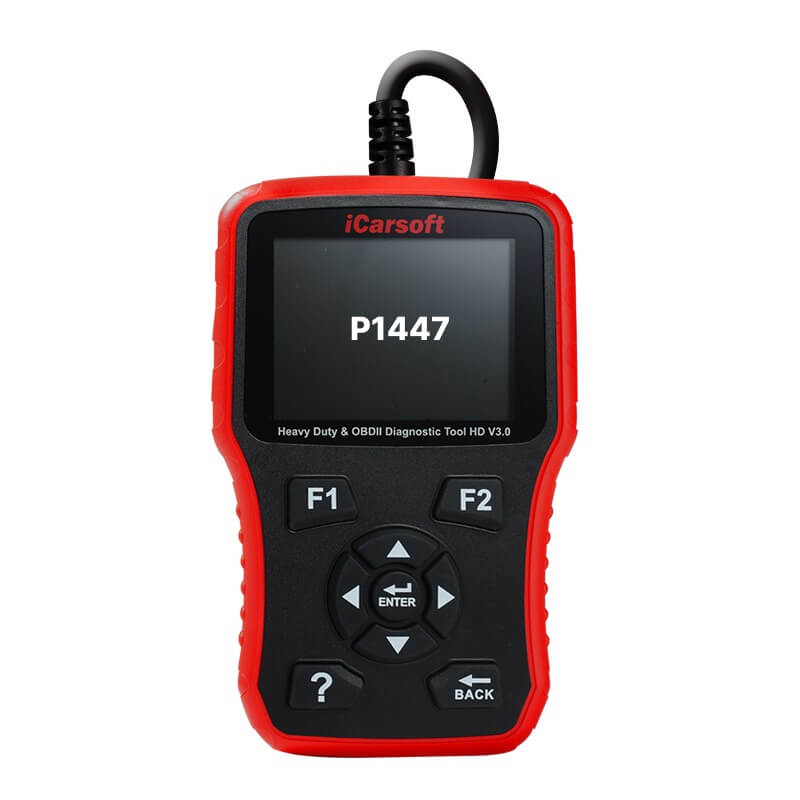P1447 – Diesel Oxidation Catalyst Malfunction
POSTED IN pcodes
Welcome to our article on P1447 – Diesel Oxidation Catalyst Malfunction. If you’re experiencing issues with your diesel engine and have come across this diagnostic trouble code (DTC), it’s essential to understand what it means and how to address it. In this article, we will provide you with a detailed overview of P1447, including its symptoms, causes, diagnostic process, potential repair solutions, and the importance of seeking professional assistance. Whether you’re a DIY enthusiast or a professional mechanic, this information will help you navigate through the challenges associated with a diesel oxidation catalyst malfunction.
Key Takeaways:
- P1447 is a diagnostic trouble code that indicates a Diesel Oxidation Catalyst (DOC) malfunction.
- The DOC plays a crucial role in collecting particulates from the exhaust and burning them off through regeneration.
- Symptoms of P1447 can include decreased engine performance, reduced fuel efficiency, rough idle, and increased exhaust emissions.
- Potential causes of P1447 include faulty exhaust gas temperature sensors, exhaust system leaks or restrictions, fuel system issues, EGR system malfunction, and engine mechanical problems.
- The diagnostic and repair process for P1447 involves system checks, inspecting components, addressing issues, and clearing the DTC.
- If conventional repair methods are ineffective, alternative solutions like permanent removal of the P1447 code may be considered.
- Seeking professional assistance is crucial to ensure accurate diagnosis, compliance with regulations, and optimal vehicle performance.
Severity and Symptoms of P1447
The severity of P1447 will vary depending on the specific vehicle and driving conditions. In some cases, it may not cause any noticeable symptoms, and the check engine light may be the only indication of a problem. However, in other cases, the following symptoms may be experienced:
- Decreased engine performance: The vehicle may struggle during acceleration or have reduced power.
- Reduced fuel efficiency: P1447 can lead to increased fuel consumption, resulting in fewer miles per gallon.
- Rough idle or stalling: The engine may idle erratically or even stall when at a stop.
- Increased exhaust emissions: P1447 can contribute to higher levels of pollutants in the exhaust, resulting in smokier emissions.
- Overheating of the catalytic converter: A malfunctioning diesel oxidation catalyst can cause the catalytic converter to overheat, potentially leading to damage.
In some cases, the severity of these symptoms may worsen over time if the issue causing P1447 is not addressed promptly. It is important to diagnose and resolve the problem to prevent further damage and ensure optimal vehicle performance.

The impact of P1447 severity and symptoms
“The severity level of P1447 and the presence of symptoms serve as indicators of the urgency of addressing the issue. Ignoring or delaying the necessary repairs can result in more serious engine problems, decreased fuel efficiency, and potential damage to the catalytic converter.”
Buy tested tuning file for Adblue / EGR / DPF / Adblue off now!
Register Now or Already have an account, Login now
Common Causes of P1447
When the P1447 code appears, it is crucial to identify the underlying causes of the diesel oxidation catalyst malfunction. Here are the common causes that trigger P1447:
- Faulty exhaust gas temperature sensor: A malfunctioning exhaust gas temperature sensor, which is responsible for monitoring the temperature of the gases, can lead to the activation of the P1447 code.
- Exhaust system leaks or restrictions: Leaks or restrictions in the exhaust system can disrupt the flow of exhaust gases and interfere with accurate temperature readings, resulting in the P1447 code.
- Fuel system issues: Problems such as fuel leaks or restrictions within the fuel system can impact the operation of the diesel oxidation catalyst, triggering the P1447 code.
- EGR system malfunction: If the exhaust gas recirculation (EGR) system fails to function correctly, it can affect the temperature of the exhaust gases, which may lead to the activation of the P1447 code.
- Engine mechanical issues: Various mechanical problems within the engine, such as misfires or incorrect timing, can hinder the proper operation of the diesel oxidation catalyst and cause the P1447 code to appear.
Identifying these common causes is crucial for efficient troubleshooting and subsequent repair of the P1447 code.

| Causes | Description |
|---|---|
| Faulty exhaust gas temperature sensor | Malfunctioning sensor responsible for monitoring exhaust gas temperature. |
| Exhaust system leaks or restrictions | Leaks or restrictions in the exhaust system that disrupt the flow of exhaust gases. |
| Fuel system issues | Problems like fuel leaks or restrictions in the fuel system affecting the operation of the diesel oxidation catalyst. |
| EGR system malfunction | Malfunctioning exhaust gas recirculation (EGR) system affecting exhaust gas temperature. |
| Engine mechanical issues | Mechanical problems within the engine, such as misfires or incorrect timing. |
Diagnostic and Repair Process for P1447
To effectively diagnose and repair the P1447 code indicating a Diesel Oxidation Catalyst (DOC) malfunction, follow these steps:
- Perform a diagnostic system check: Before starting the specific diagnostic procedure for P1447, it is recommended to perform a general diagnostic system check on the vehicle to identify any other potential issues.
- Check for other DTCs: Use a scan tool to check for any other diagnostic trouble codes (DTCs) that may be present in addition to P1447. Address these codes first before focusing on P1447.
- Inspect the exhaust gas temperature sensor: Check the operation and condition of the exhaust gas temperature sensor, which monitors the temperature of the gases before and after the Diesel Oxidation Catalyst. If the sensor is faulty, it may trigger the P1447 code. Replace the sensor if necessary.
- Check for exhaust system leaks or restrictions: Inspect the exhaust system for any leaks or restrictions, such as damaged pipes or clogged catalytic converters. Leaks or restrictions can affect the overall performance of the Diesel Oxidation Catalyst. Repair or replace any damaged components as needed.
- Inspect the fuel system: Check the fuel system for any issues such as leaks or restrictions that could impact the operation of the Diesel Oxidation Catalyst. Repair or replace fuel system components as necessary.
- Test the EGR system: Verify that the exhaust gas recirculation (EGR) system is functioning properly and not causing temperature deviations that could trigger the P1447 code. Repair or replace any malfunctioning EGR system components.
- Address engine mechanical issues: If there are any engine mechanical issues, such as misfires or timing problems, resolve them as they can affect the operation of the Diesel Oxidation Catalyst. Fix any identified engine mechanical issues.
- Clear the DTC: After completing the necessary repairs, use a scan tool to clear the P1447 code and verify that it does not return. This ensures that the repairs have effectively resolved the Diesel Oxidation Catalyst malfunction.
Following these diagnostic and repair steps will help resolve the P1447 code and ensure the proper functioning of the Diesel Oxidation Catalyst.
Alternative Solution for P1447
If professional assistance is not available or the repair process is not effective, an alternative solution for P1447 is the permanent removal of the specific Pcode. This can be done by uploading the Engine Control Unit (ECU) file to a portal that specializes in ECU tuning and modifications.
However, it should be noted that this alternative solution may not be legal in some regions and may have implications for vehicle emissions compliance.
In situations where traditional repair methods have failed, permanently removing the P1447 code from the ECU file offers an alternative approach to address the issue. By utilizing specialized ECU tuning and modification services, the code can be effectively eliminated, providing a potential solution for diesel oxidation catalyst malfunction.
However, before considering this alternative solution, it’s crucial to understand the potential legal implications and consequences related to vehicle emissions compliance. In some regions, permanently removing the P1447 code may not be permitted, as it can impact the emissions standards and environmental regulations. It’s essential to consult with local authorities or seek professional advice to ensure compliance with applicable laws and regulations.
Importance of Professional Assistance
While alternative solutions may seem tempting, it is important to highlight the importance of seeking professional assistance for the diagnosis and repair of P1447. Professional technicians have the knowledge, experience, and tools to accurately diagnose the underlying issues causing the code and provide effective repair solutions. They can ensure that the repairs comply with legal and regulatory requirements and help maintain the overall performance and emissions compliance of the vehicle.
Conclusion
In conclusion, the P1447 code indicates a diesel oxidation catalyst malfunction and can have various causes, symptoms, and severity levels. It is crucial to follow a diagnostic and repair process to address the underlying issues and resolve the code effectively. By identifying and rectifying the faulty components or systems, such as the exhaust gas temperature sensor, exhaust system leaks or restrictions, fuel system, EGR system, and engine mechanical issues, the diesel oxidation catalyst can be restored to its optimal functioning.
While alternative solutions may exist, such as the permanent removal of the P1447 code, it is highly recommended to seek professional assistance for accurate diagnosis and repair. Professional technicians possess the expertise, experience, and specialized tools required to thoroughly assess the issue and provide effective solutions. Moreover, relying on professional assistance ensures compliance with legal and regulatory requirements, as well as the maintenance of overall vehicle performance and emissions compliance.
In summary, addressing the P1447 code involves diagnosing and resolving the diesel oxidation catalyst malfunction through a systematic approach. It is important to follow a diagnostic and repair process to eliminate the underlying causes and restore the catalyst’s proper functioning. Seeking professional help is the recommended course of action to ensure accurate diagnosis, adherence to regulations, and optimal vehicle performance in the long run.
FAQ
What does the P1447 DTC mean?
The P1447 DTC indicates a Diesel Oxidation Catalyst (DOC) malfunction in the vehicle’s exhaust aftertreatment system.
What is the severity of P1447 and what symptoms may occur?
The severity of P1447 can vary, but it may cause decreased engine performance, reduced fuel efficiency, rough idle or stalling, increased exhaust emissions, and overheating of the catalytic converter.
What are the common causes of P1447?
Common causes of P1447 include a faulty exhaust gas temperature sensor, exhaust system leaks or restrictions, fuel system issues, EGR system malfunction, and engine mechanical issues.
How can I diagnose and repair the P1447 code?
To diagnose and repair the P1447 code, you should perform a diagnostic system check, check for other DTCs, inspect the exhaust gas temperature sensor, check for exhaust system leaks or restrictions, inspect the fuel system, test the EGR system, and address engine mechanical issues.
Is there an alternative solution for P1447?
An alternative solution for P1447 is the permanent removal of the specific P code through ECU tuning and modifications. However, it may not be legal in some regions and may impact vehicle emissions compliance.
Why is professional assistance important for P1447?
Professional technicians have the knowledge, experience, and tools to accurately diagnose the underlying issues causing the code and provide effective repair solutions. They can ensure compliance with legal and regulatory requirements and help maintain the overall performance and emissions compliance of the vehicle.


